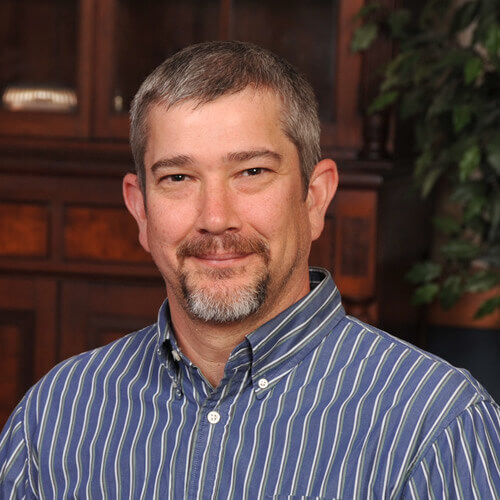
Professor of Psychology
- Office: Sutton Science Center
- Department: Division of Behavioral Sciences
- Phone: 865-981-8268
- Email: chad.schrock@maryvillecollege.edu
- Education: B.A., Mississippi State University; Ph.D., University of California, Santa Cruz
I received a Ph.D. in cognitive psychology with an emphasis in psycholinguistics in 2001 from the University of California, Santa Cruz. My research there focused on the production and comprehension of language. I also spent some time as a researcher at Georgia Tech in the Attention and Memory lab, focusing on experimental studies of working memory capacity. In 2002 I joined the faculty at Maryville College.
Research interests
Working Memory and Attention Research
Working memory capacity (WMC) is the controlled-attention component of the working memory system. Our working memory is a domain independent, limited capacity processing resource that we use to keep relevant information active and available, while at the same time filtering out distraction.
My students have done all sorts of working memory and attention research in the lab. For example, students have done studies examining how working memory capacity influences language production and comprehension, how a person’s WMC can change performance on a secondary task, how WMC and attention changes the experience of pain, how individuals differ in attention control (e.g. people with ADHD) and how working memory can affect auditory and visual perception.
Measures of WMC reliably correlate with a diverse array of abilities such as language comprehension (Daneman & Carpenter, 1980), note-taking (Kiewra & Benton, 1988), bridge playing (Clarkson-Smith & Hartley, 1990), computer-language learning (Shute, 1991), and novel reasoning (Kyllonen & Christal, 1990). One explanation for these findings is that all of these activities share an underlying need for controlled attention (Engle, Tuholski, Laughlin, & Conway, 1999). I am interested in all sorts of working memory research, but I have been most directly involved in studies that make use of eye movements and pupil diameter as dependent measures to study our ability to control attention.
Language Research
I’m most interested in how we understand each other in everyday conversation. In some ways, this should be the most difficult environment for using language. First, conversationalists do not have the luxury of carefully editing their contributions, there simply isn’t the time, and doing so might make you appear inattentive, rude, or confused (try it sometime). Second, conversations are apt to take unexpected twists and turns at any moment because at least two people, and sometimes many more, are helping to create the conversation. Third, speakers must not only get their message across, but do so appropriately. If you want your boss to close the door on her way out, you could say “Close the door on your way out”, but you probably won’t; instead, you are more likely to say something like, “Would you mind terribly closing that door when you leave?”. The latter sounds more appropriate, but why should that be? My research focuses on how we as speakers and listeners successfully deal with these characteristics of spontaneous speech.